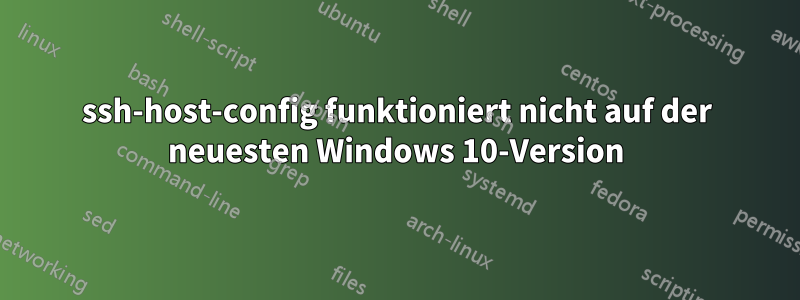
Durchgeführte Schritte:
- Installieren Sie Cygwin über:
C:\tmp\setup-x86_64.exe -q -B -R C:\cygwin -s http://cygwin.mirror.constant.com -l C:\tmp -A -o -P curl,rsync,dos2unix,make,git,unzip,openssh OpenSSL -
mkpasswd -l -c > C:\cygwin\etc\passwd mkgroup -l -c > C:\cygwin\etc\groups
ssh-host-konfiguration:
- Erwartet:
*** Query: Should StrictModes be used? (yes/no) yes *** Query: Should privilege separation be used? <yes/no>: yes *** Query: New local account 'sshd'? <yes/no>: yes *** Query: Do you want to install sshd as a service? *** Query: <Say "no" if it is already installed as a service> <yes/no>: yes *** Query: Enter the value of CYGWIN for the deamon: [] binmode ntsec *** Query: Do you want to use a different name? (yes/no) yes/no - Tatsächlich:
*** Query: Should StrictModes be used? (yes/no) yes *** Info: Updating /etc/sshd_config file *** Info: Sshd service is already installed. *** Info: Host configuration finished. Have fun!- Zuvor funktionierte alles unter Windows 10 und 7 wie erwartet, aber nicht unter der neuesten Version von Windows 10, da OpenSSL vorinstalliert ist.(die Deinstallation löst das Problem nicht):
%WinDir%\system32\openssl\sshd.exe
- Zuvor funktionierte alles unter Windows 10 und 7 wie erwartet, aber nicht unter der neuesten Version von Windows 10, da OpenSSL vorinstalliert ist.(die Deinstallation löst das Problem nicht):
Antwort1
Schritt bist nicht mehr erforderlich.
Das Problem dabei ssh-host-configist, dass Microsoft jetzt standardmäßig installiert, sshdsodass Sie einen anderen Namen verwenden müssen, wie in der neuesten Version angegeben
https://www.cygwin.com/ml/cygwin-announce/2019-04/msg00017.html
Portability
-----------
* sshd(8) Cygwin: Change service name to cygsshd to avoid collision
with Microsoft's OpenSSH port.


